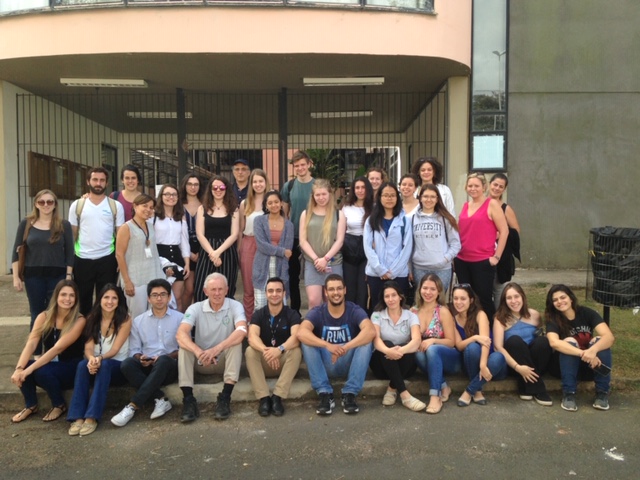
August 7, 2019, by Lexi Earl
Studying food safety in Brazil
The Food Safety in Brazil course is a second year module offered to Biosciences students at the University of Nottingham, funded by the Future Food Beacon. Established in 2017, the Food Safety course offers students the opportunity to travel to Brazil for a week to learn about contemporary issues in food safety. The course draws on expertise from UoN, ITAL, UNICAMP and UNESP. Students are given lectures on a range of topics from different academics and researchers, are taken on tours of facilities, and are able to experience life in Brazil too. UK students are provided the opportunity to learn from health professionals and students working with underprivileged communities in poorer areas of Brazil.

Each day of the one week course focuses on a different aspect of food safety. In 2019, the course included lectures on developing food ingredients from fruit processing residue, the microbiological safety of meat and meat products, the health benefits from Brazilian fruits for people with obesity, the application of metabolomics to personalised medicine, food allergies, nutrition and bioactive substances, and sports nutrition for high performance.
Students attending the course were invited to provide responses to their experiences, some of which we have highlighted below.

“As an agricultural student, it was interesting to see a different side of the food production chain. […] Personally, I feel it is important to understand all aspects of the food production chain in order to understand the food products consumers are interested in […].”
“Our first day was organized by ITAL, the Brazilian food technology institute. The very first presentation was about utilising leftover mango peels for extraction of edible mass full of nutrients which can be ground to mango flour and used to enrich confectionary products to become healthier. I absolutely loved the idea and immediately asked Jo [Dr Jo Gould] if I could do something like that for my 3rd year project”.
“One of my favourite topics during the entire seminar was the development of by-products of fruits and vegetables into consumable food to avoid food losses. The lecture showed that certain fruits varieties, such as the ‘Ubá Mango’ can have at least 40% of the fruit disregarded as they include the seed and the peels, which usually are not consumed. Surprisingly, the peels have the highest nutrient contents, even more than the pulp itself. They have a project called ‘ByProFood’, which develops products from coffee, banana and coffee residues. […]”.
“I was mostly amazed by the visit to the Synchrotron and the SIRIUS. Visiting these two particle accelerators located in the Brazilian Synchrotron Light Laboratory was an overwhelming experience. I have never seen a particle accelerator or was even aware of the uses of these machines to research in physics, chemistry, material science and life sciences. This experience has broadened my views of how the different sciences are all connected”.
“On 25 April, we went to UNICAMP and this day was my favourite as I got to know so many interesting researchers. ‘Processing food by high pressure technology’ was my favourite. This technology is very beneficial to the food product as it will not have an effect on nutrients, flavour, and colour. […] I found it very fascinating that so many works need to be done for each food and drink product in order to make it safe and good quality for consumers”.
“On 25 April a lecture was delivered on ‘Bioactive compounds nutrition and health’. This was my favourite lecture delivered throughout the whole five days as it addressed the gut-brain axis and its relation to food and cognition. Specifically, the correlation between obesity and the onset of Alzheimer’s disease. So much so that Alzheimer’s disease is thought to be possibly Type 3 diabetes. I found this extremely interesting as I have never thought that such a correlation existed. Obesity produces specific biomarkers that can be used to identify the early onset of Alzheimer’s disease. Noticing these biomarkers can potentially slow down the onset of Alzheimer’s and therefore dementia. I also thought it was miraculous that in the studies presented to us by UNICAMP that these biomarkers were considerably reduced when the mouse test subjects were given fruit; specifically, Jabuticaba. This drew to the conclusion that even if a person was obese with the proper intake of fruit, they can improve their biomarkers presented as well as cognition. This was utterly fascinating and I though Jabuticaba should be named a miracle fruit”.
“I really enjoyed taking part in the Food Safety in Brazil module and think it was a highly valuable experience. The opportunities which the module provided me in relation to lectures and the field visits, but also in terms of travelling to a new country, experiencing a different culture and meeting new people are irreplaceable. I think that I have come away from Brazil with a new understanding of the impact and importance of research within the area of Biosciences and more specifically food science, as well as a new appreciation for the issues being faced by a developing country (for example, the impact of reduced access to gyms or nutritious foods on the health of poorer communities)”.
“I also feel this experience has opened my eyes to a vast range of opportunities and careers which are possible with a Food Science and Nutrition degree, that I hadn’t previously considered. […]”.
No comments yet, fill out a comment to be the first

Leave a Reply